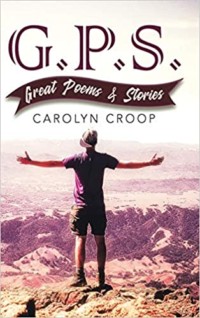Title: G.P.S. Great Poems and Stories
Author: Carolyn Croop
Publisher: Carolyn Croop
ISBN: 978-1-7350731-2-5
Genre: Poetry and Short Stories
Pages: 188
Reviewed by: Allison Walker
Pacific Book Review
Writer and poet Carolyn Croop is a woman writing about women, for women. Her third collection of works, G.P.S Great Poems and Stories, she writes about themes of love, motherhood and self-exploration. There is sometimes an undercurrent of frustration, other times the suggestion of violence. She shares the best and worst of women’s relationships, and the kindest and the harshest of truths.
The book’s featured poem, “Insignificant,” captures the frustration of the glass ceiling, the feeling of constantly being beaten down and having to prove yourself over and again. It’s part anthem and part vent; and the two opposites, which are so often carried together in women’s briefcases, reappear sporadically throughout the collection.
Croop’s collection understands the need for a book of poetry and prose by a woman, for a woman and about women. Although she often writes about women’s relationships with men, she does not overload her writing worrying about the opposite sex. Croop embraces several themes; such as re-discovering oneself as a woman at a mature age, motherhood which does not define the self but does refine it, and travel. For example, while Croop offers many pieces about falling in love, her poem titled “Love Poem #1” is a sensory experience about appreciating equally the joy and sorrow of the world around you.
The featured story, “Remember the Music” is complex, both feeding the overall theme of self-discovery, but also at times creating a parody of it. The protagonist is a woman named Elaina, and the story is told posthumously by her daughter. Elaina is raised by religiously conservative parents and, as teens are wont to do, rebels against their lifestyle. She becomes brash and bossy, traits which help her become a successful career woman, but which her family and husband come to loathe. Her husband eventually divorces Elaina and takes custody of their children. Her instincts and nature constantly brutalized by the people she trusts; Elaina takes solace in music. Then one day, she finds she can’t hear music of any sort at all. Without this salve to delve into, Elaina is forced to confront others’ opinion of her and resolves to change her ways.
Croop’s writing shares and encapsulates the experiences of being a woman through several different themes. She doesn’t become bogged down in the battle of the sexes, she knows a book about women and men isn’t a book about women at all. Her writing is straightforward and uncomplicated, readers are sure to find many pieces which resonates within them.


